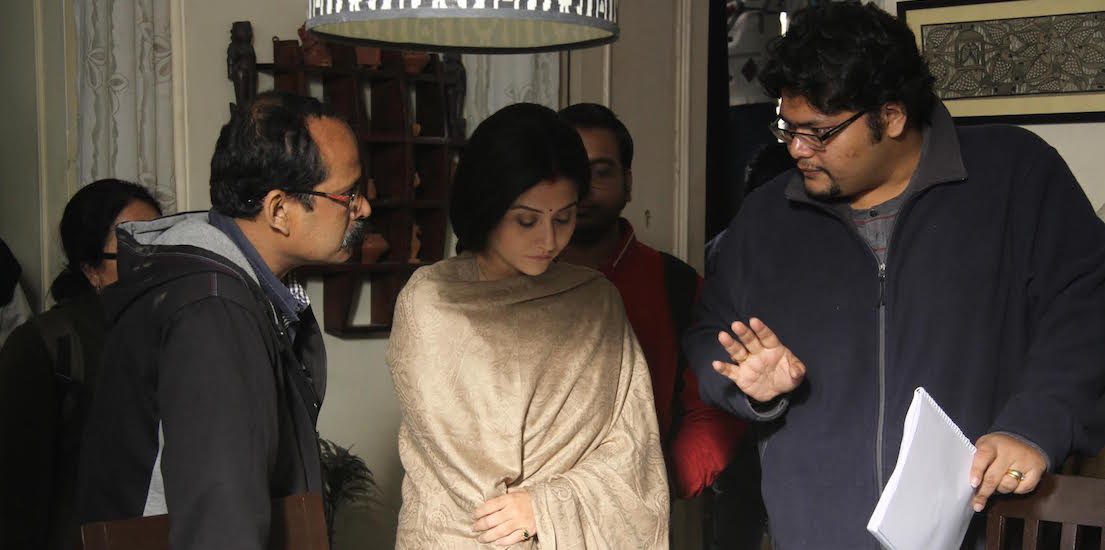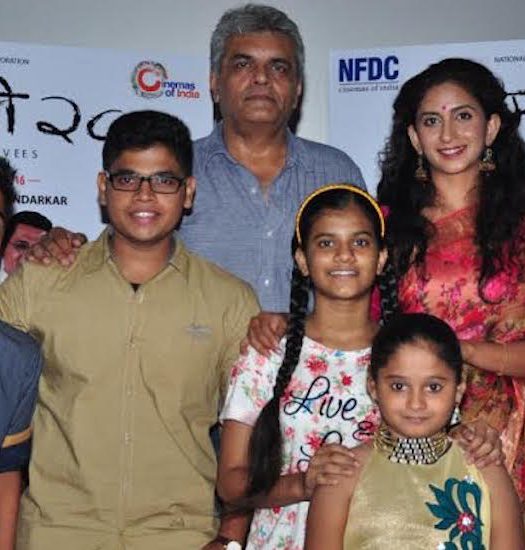My film has nothing to do with Bimal Mitra’s novel: Pratim Gupta
Saheb Bibi Golaam is a three-hander featuring the quest of three entirely different individuals running from their own images. Saheb, an ex-police officer now operates as a contract killer. Bibi is a cast off housewife who goes on to virtually establish her own harem. And lastly, Golaam is a taxi driver who challenges the norm and falls in love with a girl from a high profile family.
Journalist turned filmmaker Pratim D. Gupta speaks his heart out about living with the film for so long, why he chose the title of Saheb Bibi Golaam over others, and the big moment of a pan-India release, a week after the film’s release in Kolkata. Here are excerpts from the conversation.

Pratim Gupta (Left) with actor Anjan Dutt
How did you go about the scripting of the film? What did the process entail?
I had three images in my mind. One was of a musician who is playing at a nightclub. In the interlude of one of the songs, he goes, kills his target, comes back and completes the song. This singer cum contract killer was the first image that I had in mind. The second one was that of a housewife who’s constantly oppressed by her husband and her in-laws. She goes into the bathroom weeps and howls in a shower so that the sound doesn’t go out. The third image was that of a taxi driver driving a woman back home from a party late in the night. I saw the image as a woman sitting in the back seat and the driver having a look at her from the rear view mirror.
These three images haunted me for a very long time. I was trying to do separate films around these three images. Then I thought I might as well do a single film with the three images. That was a starting point of Saheb Bibi Golaam. I found a way to knit the three stories together.
READ: WRITING A THRILLER WITH SURESH NAIR
From Satyajit Ray to Tigmanshu Dhulia there have been many takes on Bimal Mitra’s novel. What makes this concept such a favourite?
My film has nothing to do with the novel. There have been films in the past which have borrowed titles from novels and films and had nothing to do with the previous work. There was Barsaat by Raj Kapoor and also by Bobby Deol. Nobody has a copyright on the title. I think there is nothing wrong with it as long as you can reach out to your audience. This title completely fitted my film. Saheb, Bibi and Golaam just fitted perfectly with the three protagonists of my film. I had no second thoughts on the title. My earlier title was “Jimmy, Jaya and Javed” based on the three characters’ names. I also thought of naming the film “Teen”. It was much before Sujoy Ghosh’s film by the same name. One fine day when we were about to shoot, this title came to me. It was before the shoot of the film that I got convinced about the title and decided to stick with it. Immediately we registered it (title) with Indian Motion Picture Producers’ Association (IMPPA).
There have been films in the past which have borrowed titles from novels and films and had nothing to do with the previous work
What was your thought process behind the casting of the characters of Saheb, Bibi and Golaam?
Anjan Dutt (Saheb) is an icon in Bengal. He is a multi-talented artist who operates as a musician, songwriter, singer, Actor and director. We knew each other from a very long time. We have always connected as movie lovers. As a journalist I used to visit him regularly. Over a period of time we bonded over films. When I wrote my first script in 2008 it was sent to Locarno Film Festival. I had shared that script with Anjan. He liked the script and encouraged me a lot. From then, I had always wanted to work with him. In my first film, I could not work with him because there was no character befitting him. This one I wrote with him in mind. I don’t know many actors in Kolkata who are his age and yet so sexy.
Swastika Mukherjee (Bibi) is an old friend of mine. I have known her socially and always wanted to work with her. When I wrote the part I could not think of anyone else playing this character, which had such a fantastic duality.
Ritwick Chakraborty (Golaam) was one person who I did not know personally. But I had enjoyed his work in a lot of films. I really liked his work in the National award-winning film Shabdo which was based on the life of a Foley artist. I wanted to work with him. I thought this part of Javed was a canvas for him to come and bring his magic in.
READ: SAHEB BIBI GOLAAM | FIRST LOOK

Swastika Mukherjee in a still from the film
How significant is the role of music in this film? What was your brief to your composers?
The songs have been done by Anupam Roy and the background score is by Neel Adhikari who usually works with Q. For the background music I wanted a very electronic, edgy and grungy feel. I wanted a western feel, using instruments like guitar and drums.
As far as songs are concerned Anupam is a master of melodies. My brief to myself was to incorporate songs in the thriller without hindering the pace of the film. All the songs are doing well. They are topping the charts on almost every radio channel of Kolkata. Especially “Mon Bhalo Nei” which is a romantic song and “Tomar Shawhore” which is a part of the end credits of the film.
READ: I DIDN’T SEE ANY FOOTAGE BEFORE COMPOSING THE SONGS – ANUPAM ROY
Shooting a thriller comes with its own challenges. What was your experience during the film’s making?
I am huge fan of this genre. Even one of my first scripts (Vanish), for which I have not been able to raise funds yet, is again a thriller. One of my earliest memories of watching a film was Vidhu Vinod Chopra’s Parinda. There are images from that film that still haunt me. I am a huge fan of Parinda, Coen Brothers’ films and Tarantino’s films. In spirit you might find these films in mine. I have not copy pasted anything but I have had a huge influence from these filmmakers. For example, in the film you see a person playing the flute in one of the sequences. There was a similar image of a bad guy playing the flute in that film. I don’t remember where that shot was in the film, but that stayed with me.
One of my earliest memories of watching a film was Vidhu Vinod Chopra’s Parinda. There are images from that film that still haunt me
Drishyam is distributing the film. How does that give an impetus to the film?
I had made one of the eleven short films in X-Past is Present, which was produced by Drishyam. Once I made this film, I showed it to Shiladitya Bora (CEO, Drishyam Films). He loved it and told me that this film deserves a pan-India audience. They came forward and decided to back it. The film will now reach a larger set of audience throughout the nation.
READ: DRISHYAM FILMS TO DISTRIBUTE SAHEB BIBI GOLAAM OUTSIDE BENGAL
Lastly, how would you describe your journey from a journalist to a filmmaker.
The skill set required for becoming a journalist and that of a director are completely different. When you are on the floor, directing, you are micro managing and macro managing. It is a demanding task. What you have done in your journalism days doesn’t play at all. But yes, it helped me while I was writing. The priceless years spent in a newspaper office filing stories, writing and rewriting drafts helped me work patiently. Writing feature articles helped. When I am editing the film in the post production stage then again my experience with subbing helps. But having said that, while you are on the set, working as a director, I don’t think that there is any link between a person writing for a newspaper and a person directing a film. The sensibilities are the same but skill sets are different.



